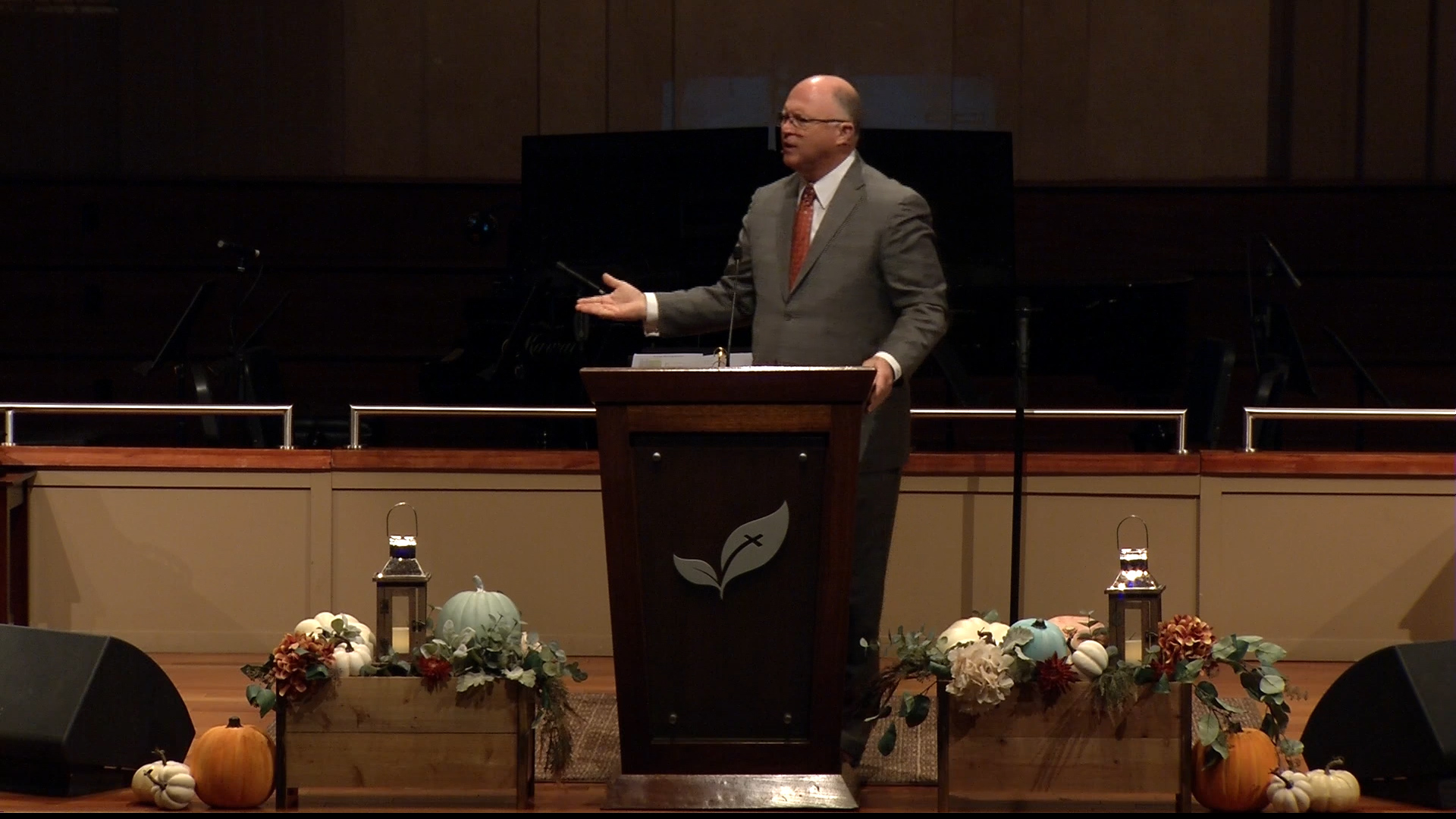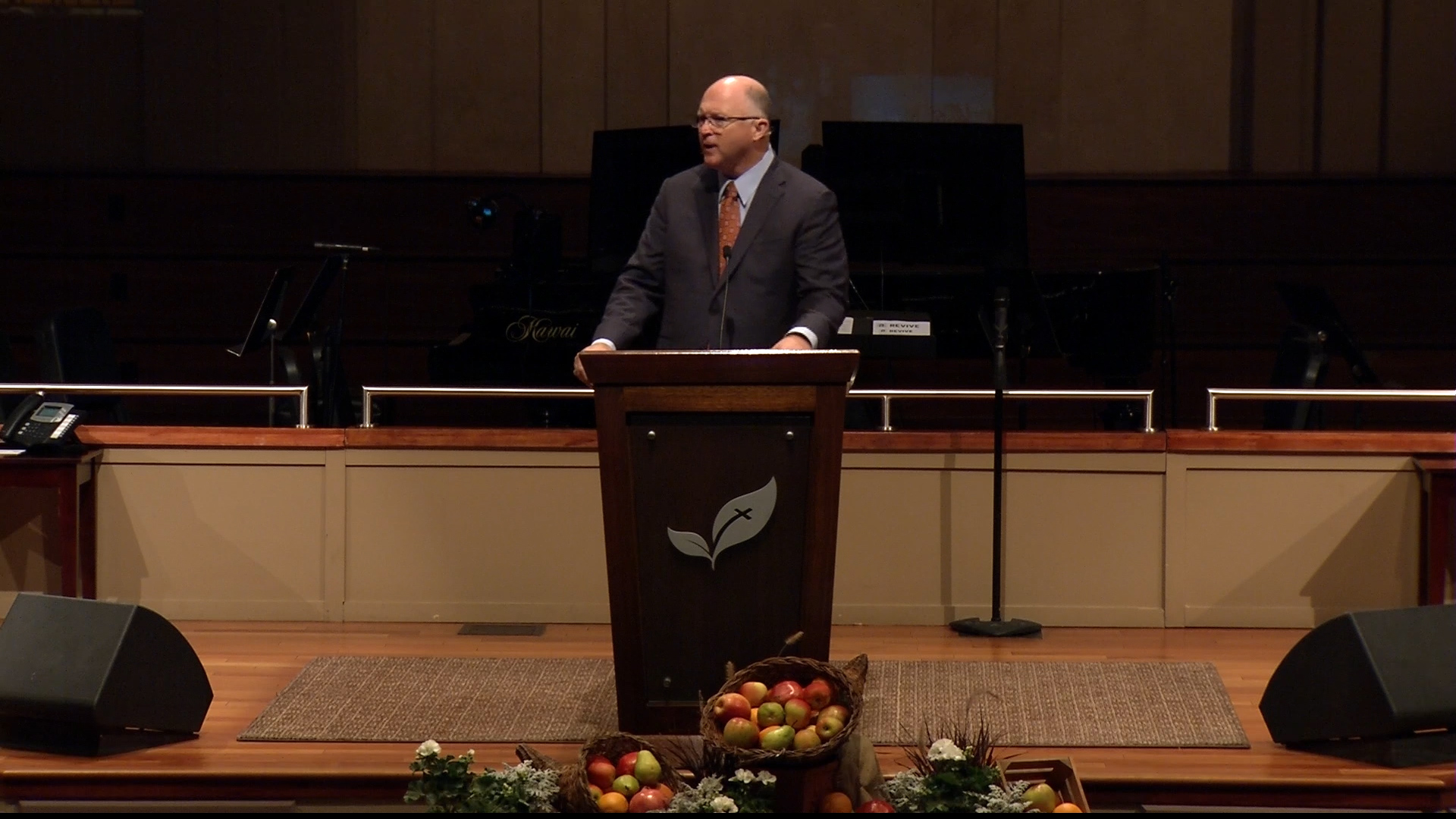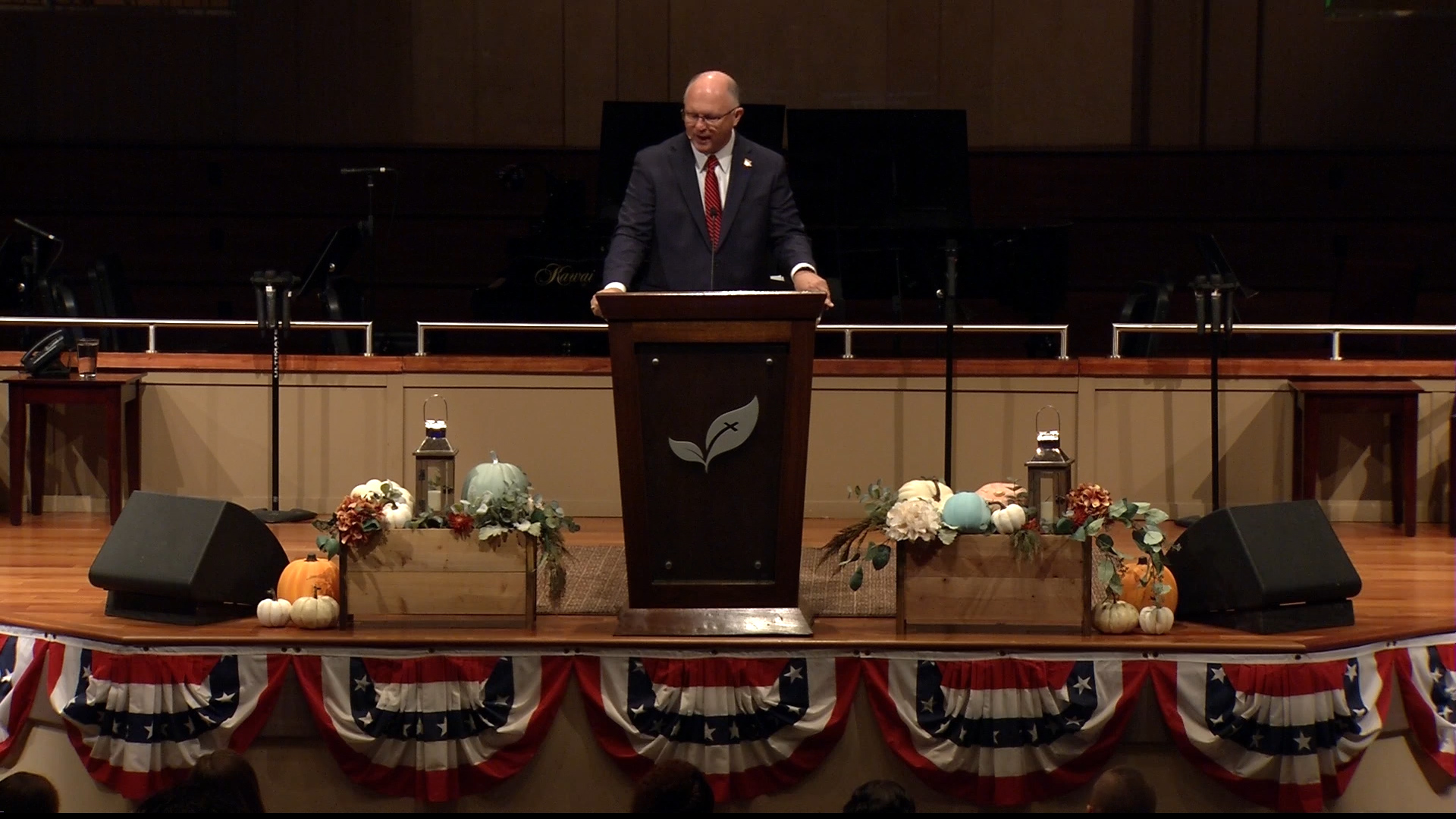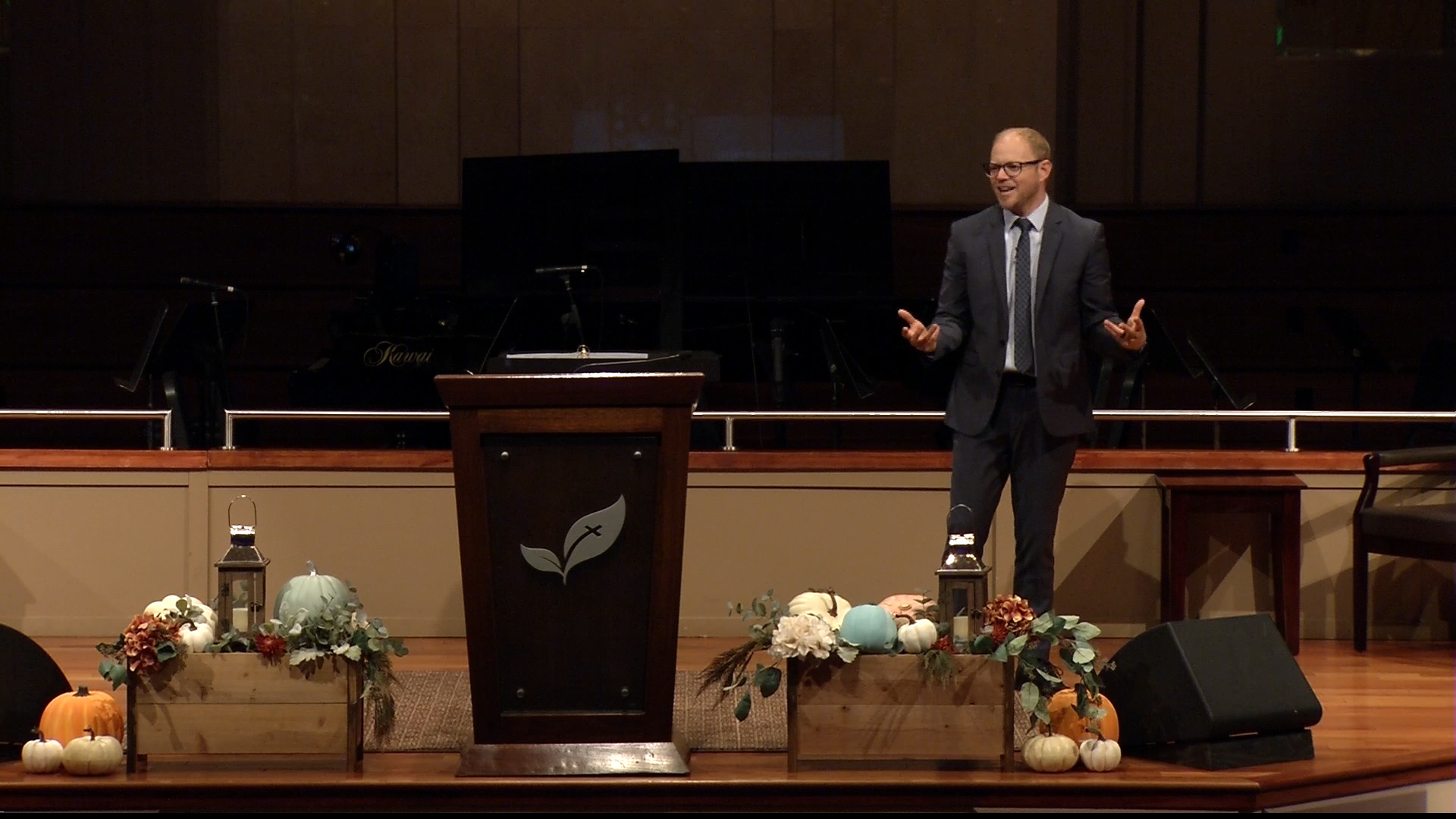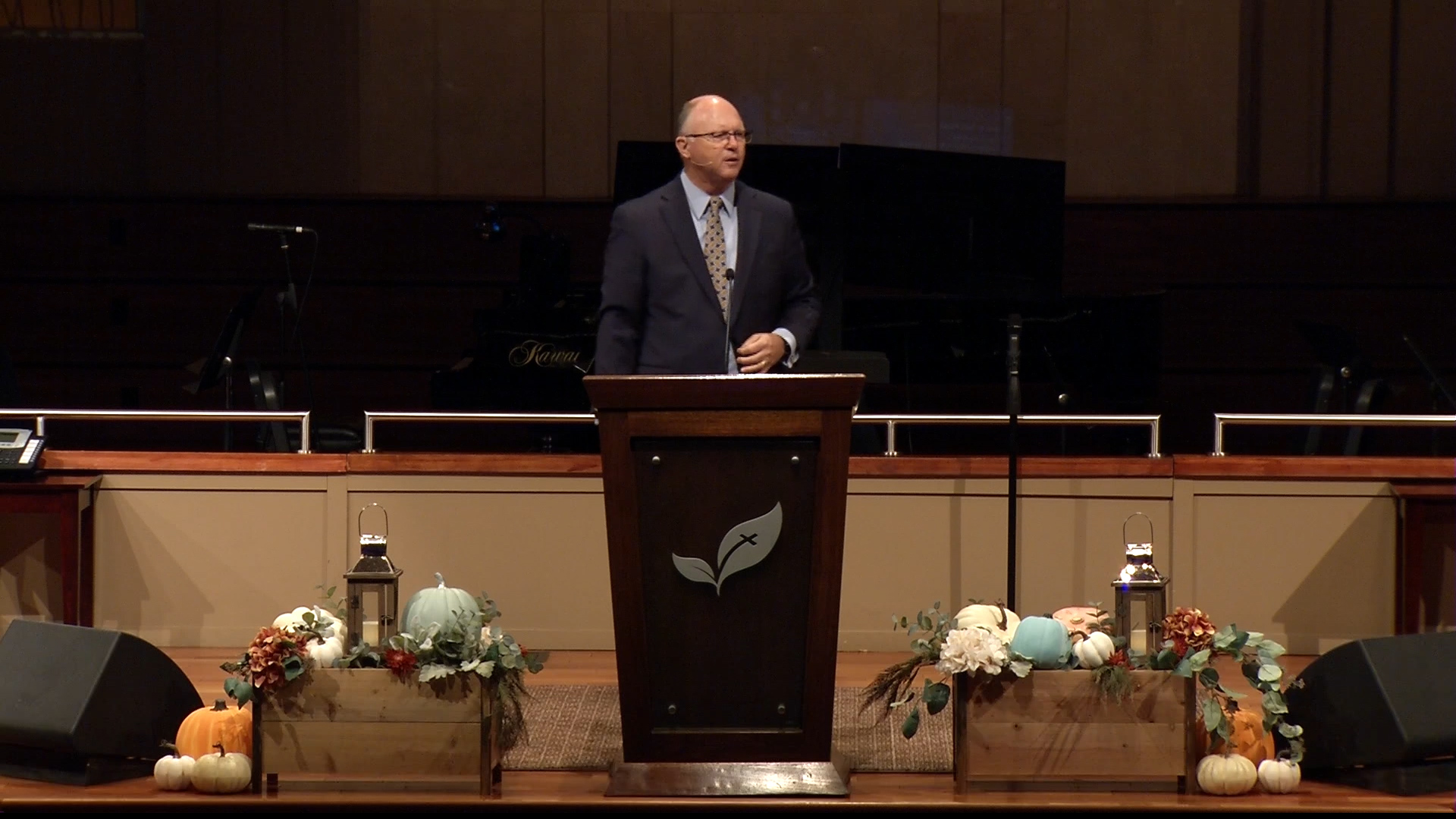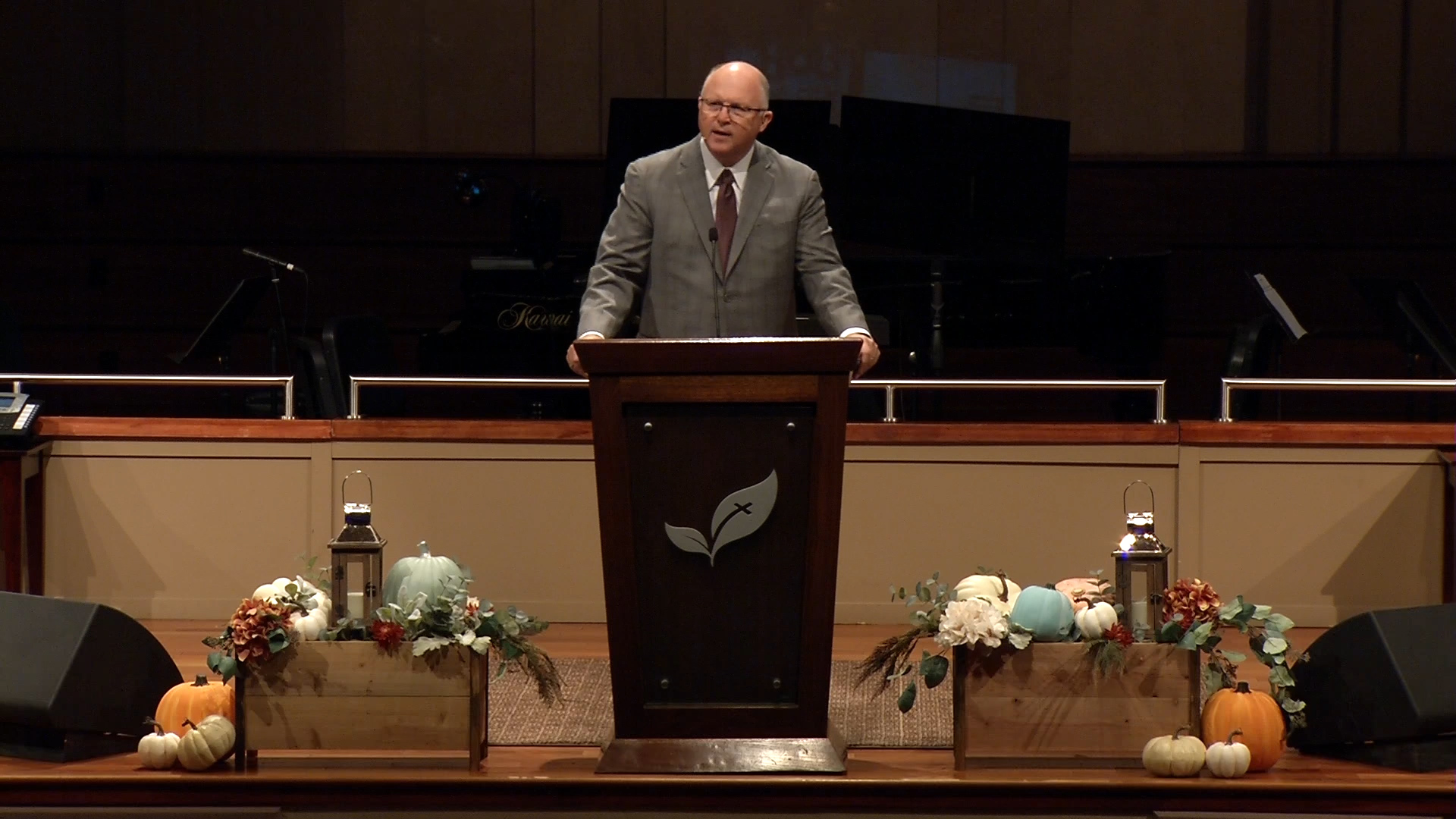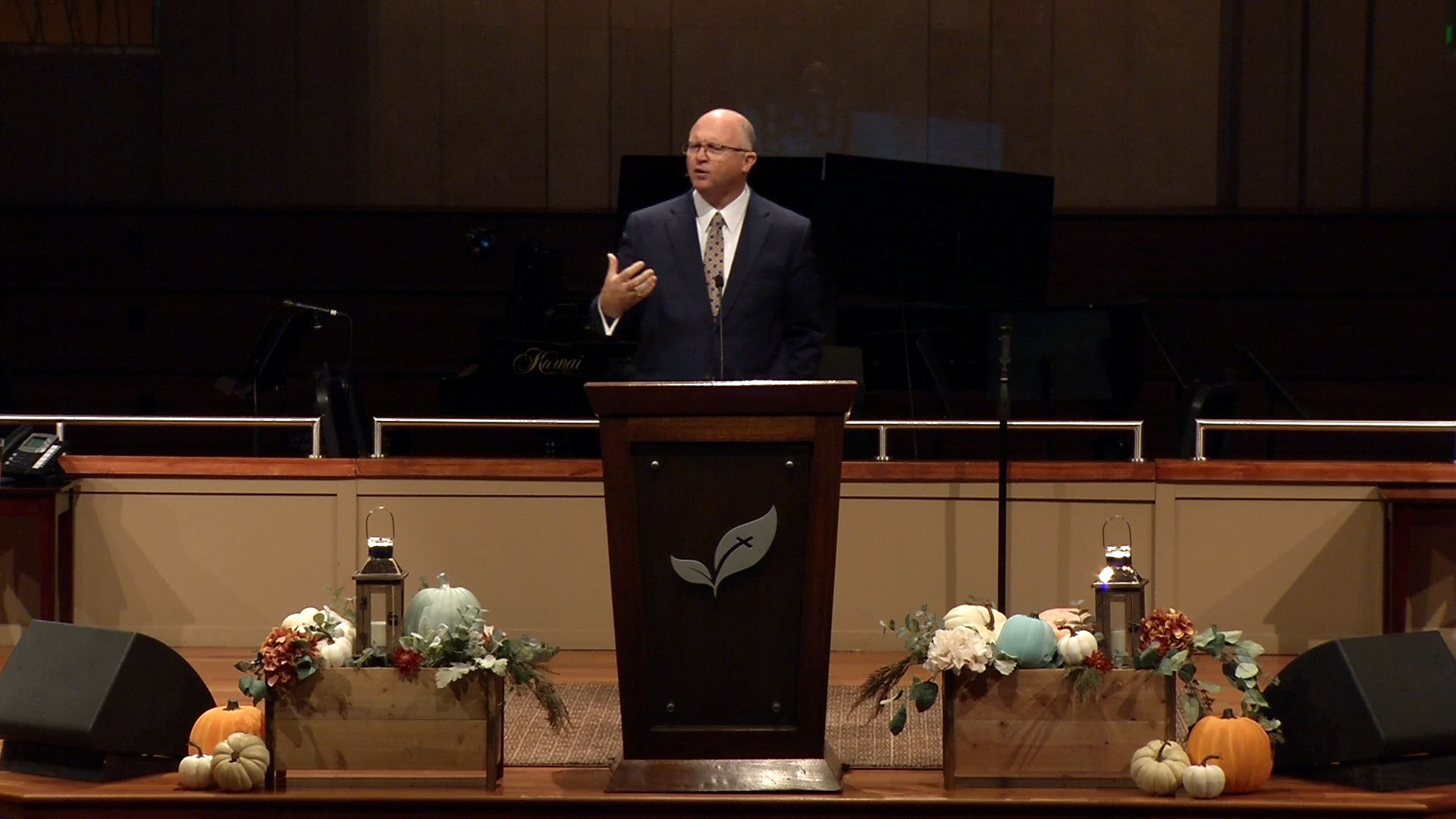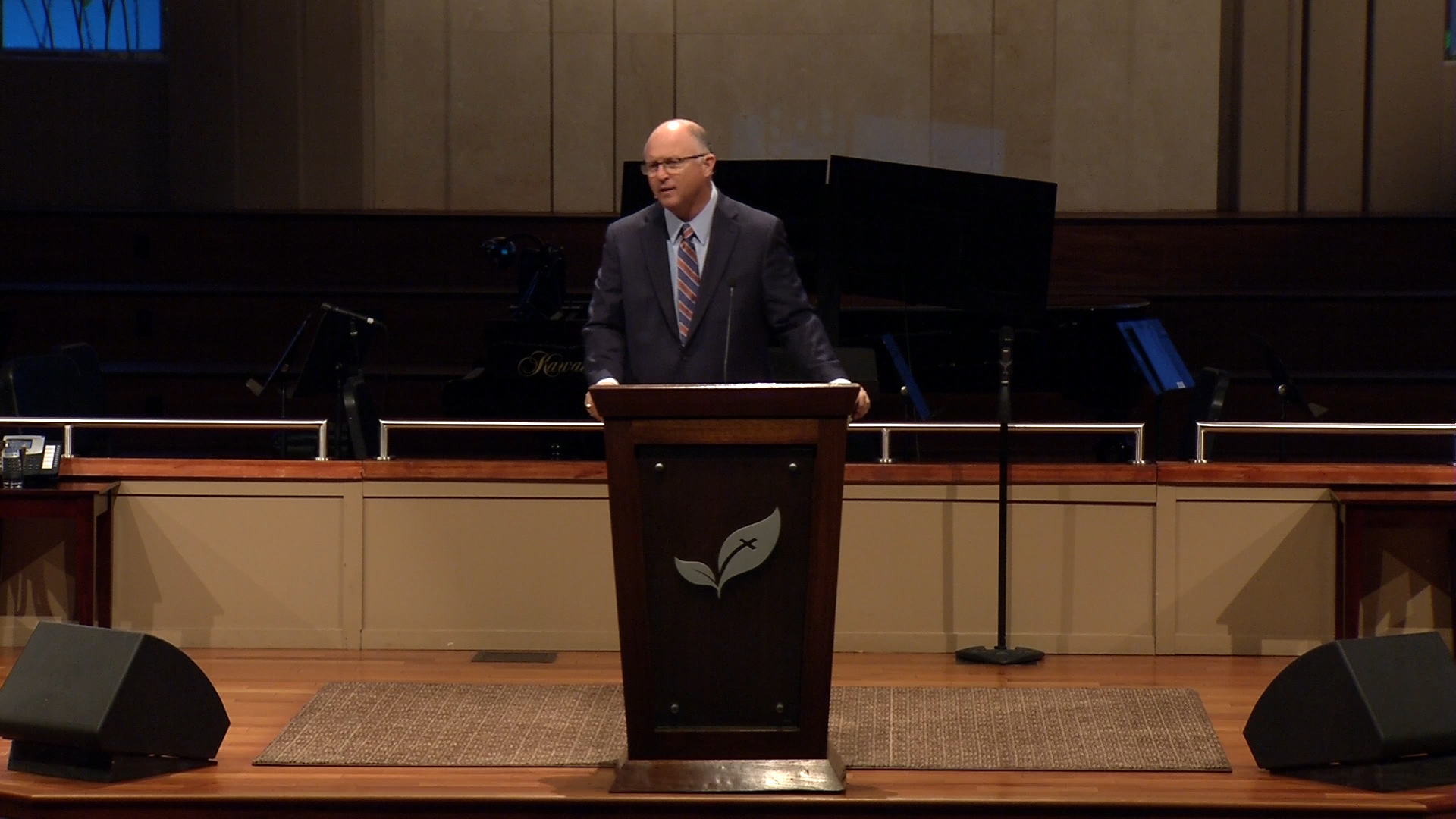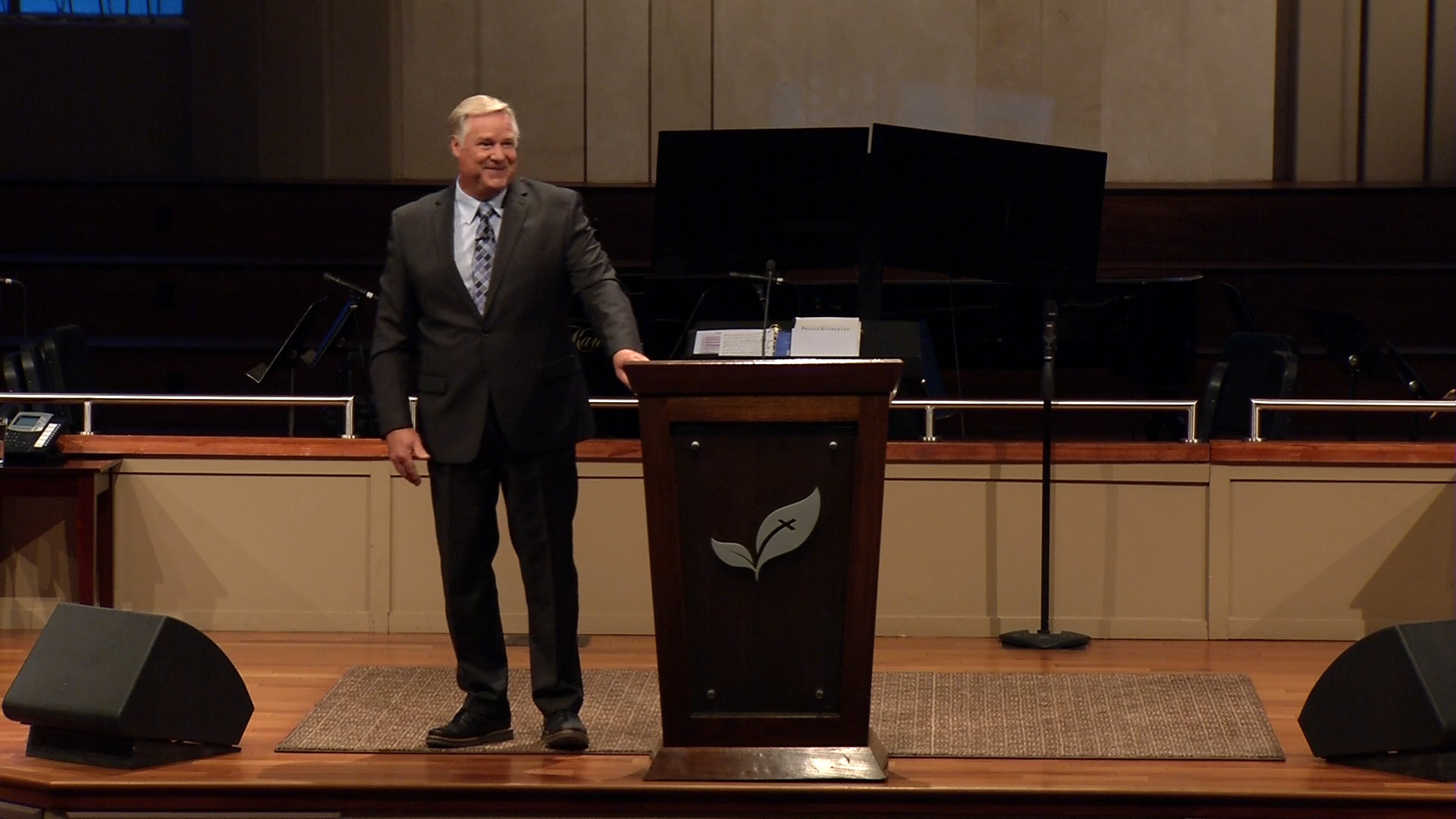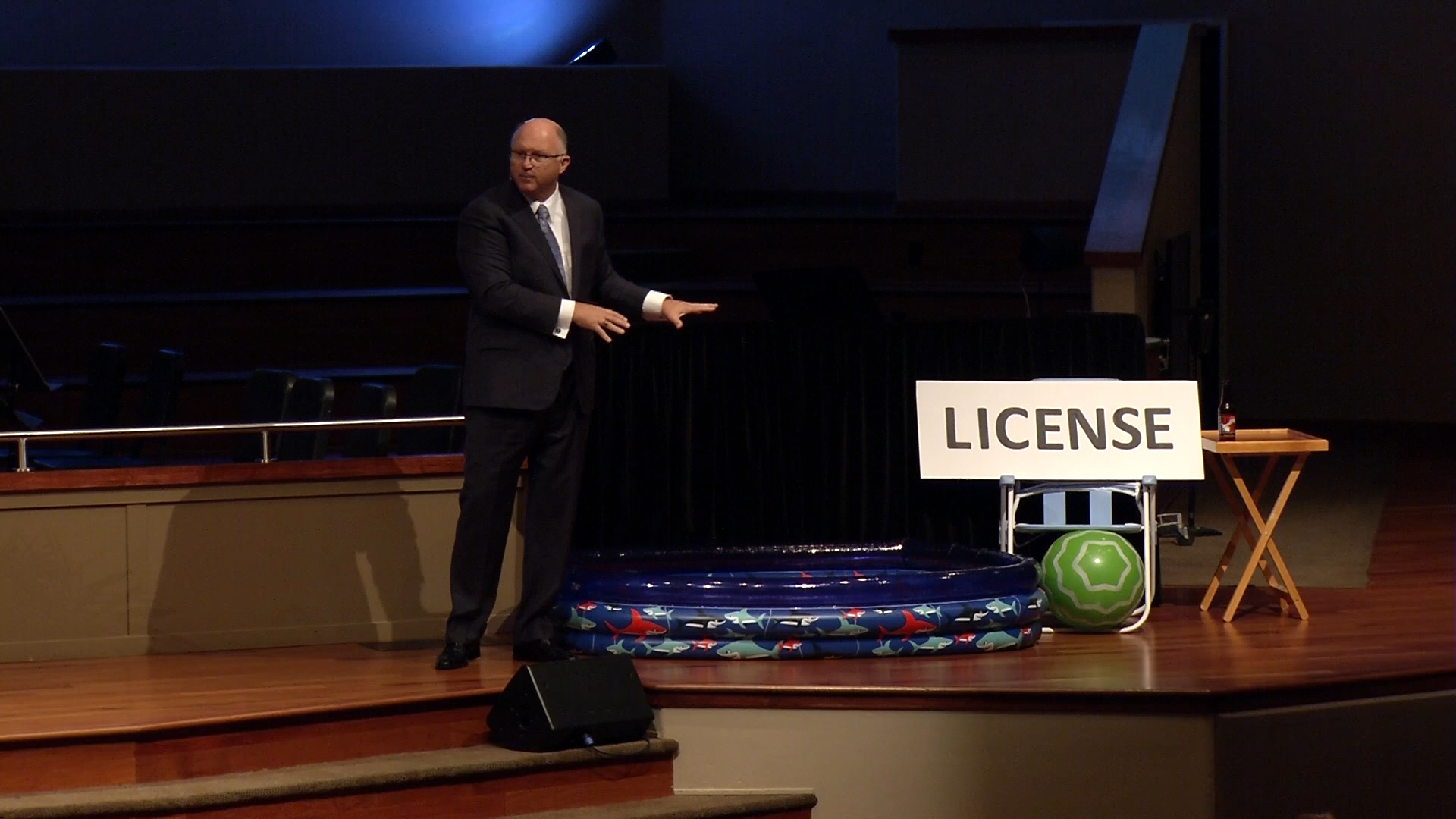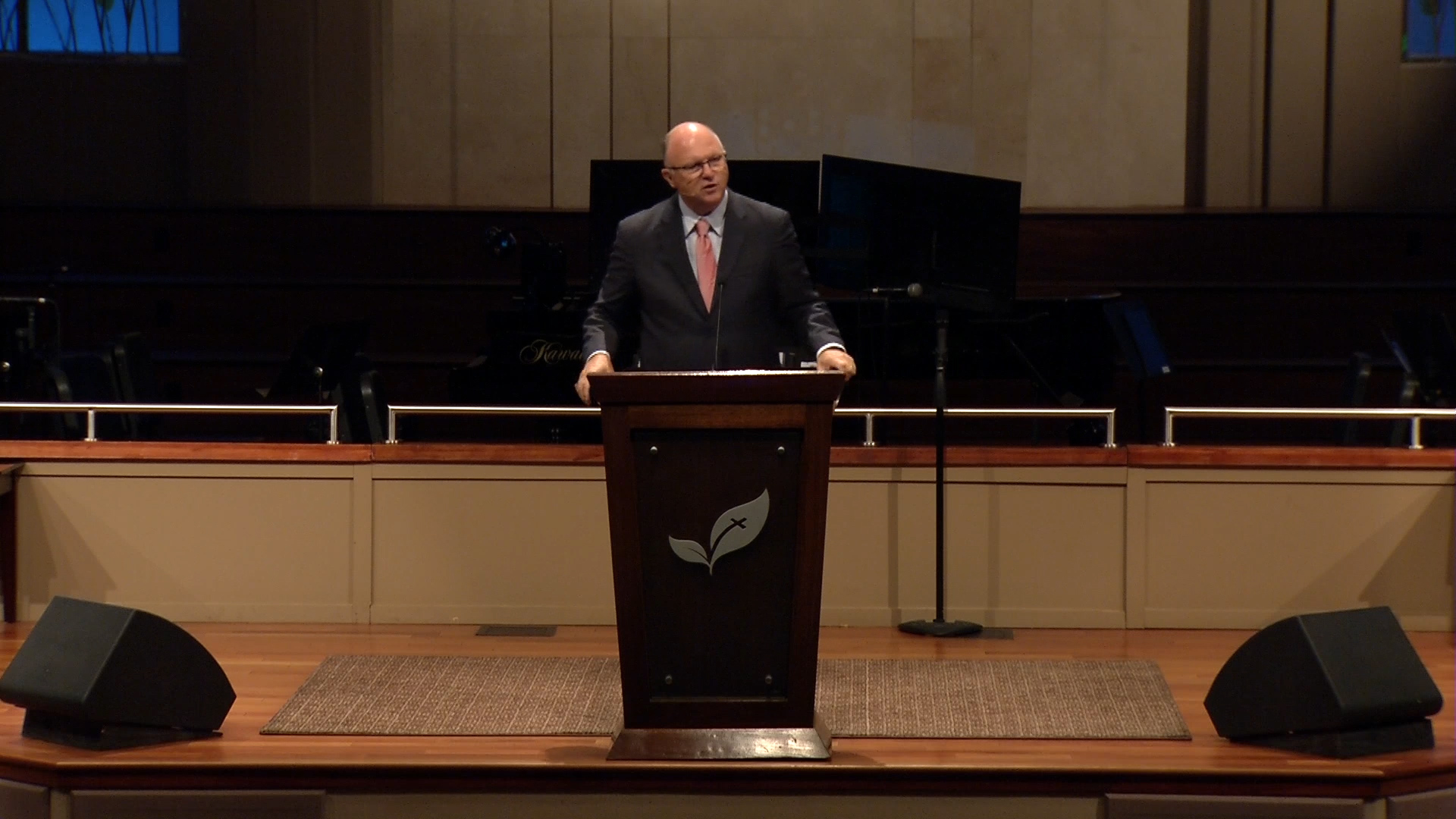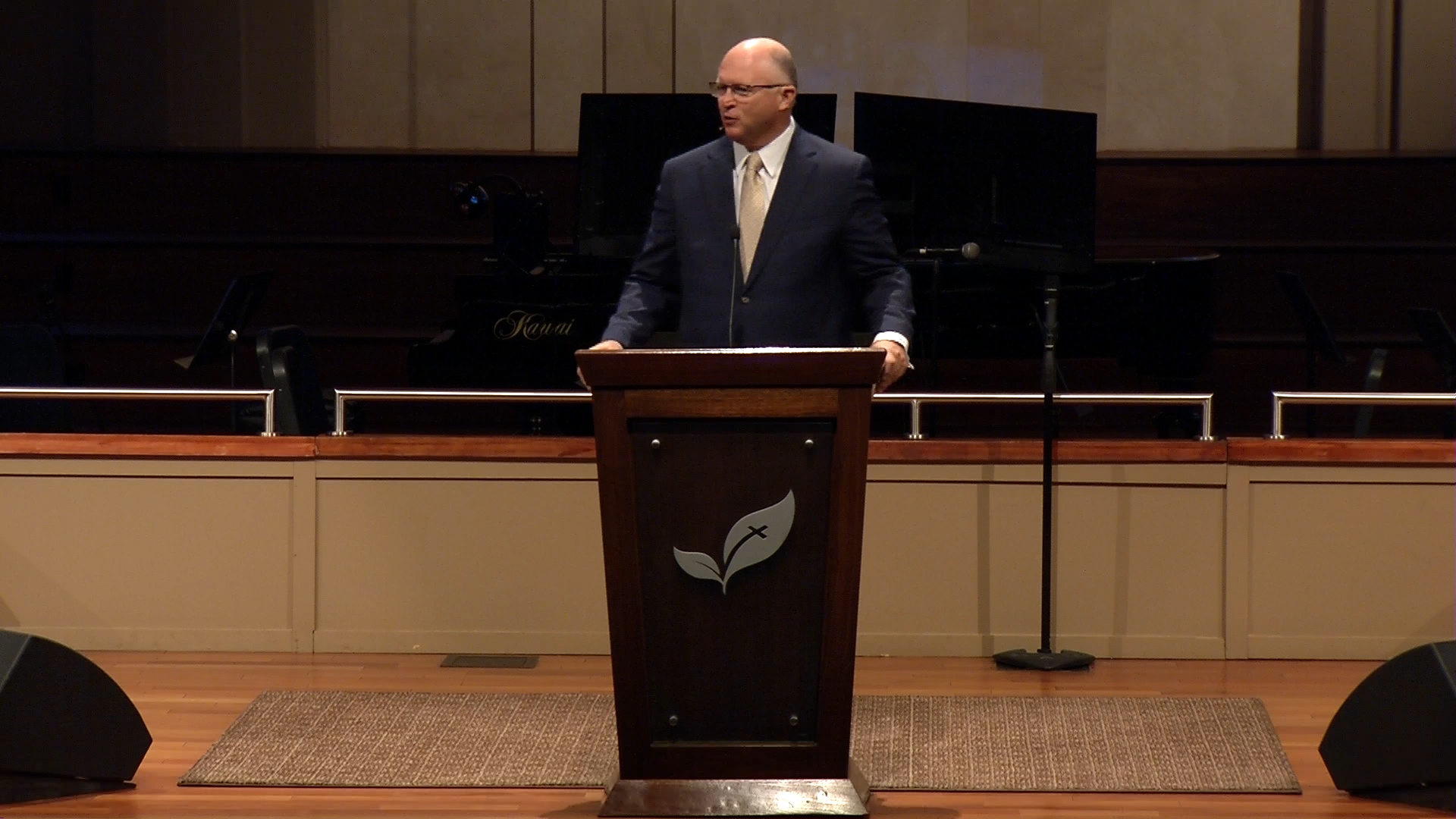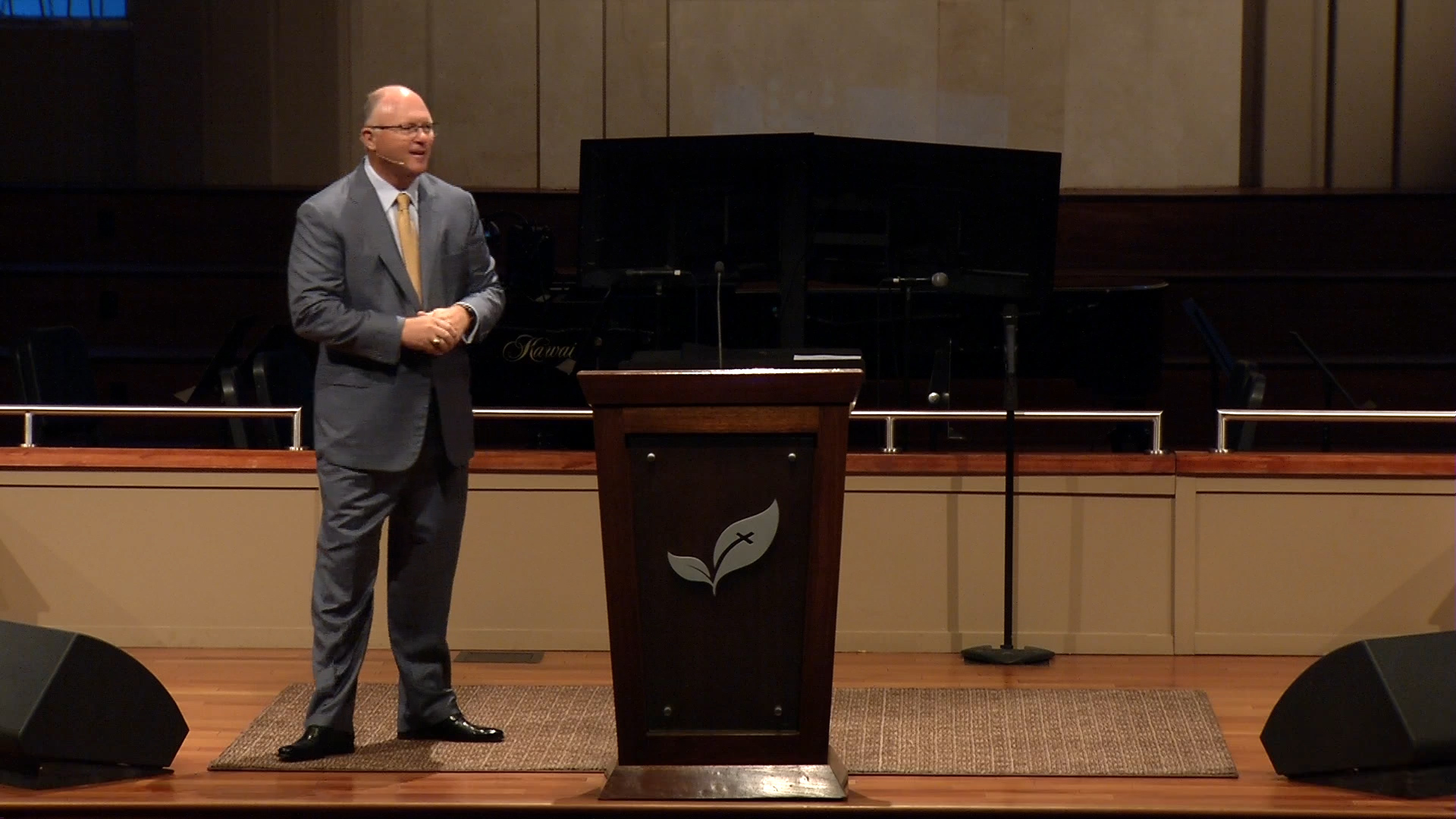Let's read, if you have your Bible or your bulletin, Ephesians 4:31. It says, "Let all bitterness, and wrath, and anger, and clamour, and evil speaking, be put away from you, with all malice: and be ye kind one to another, tenderhearted, forgiving one another, even as God for Christ's sake hath forgiven you." All right, let's pray together and we'll dive into that. Let's pray.
Father, thank you for bringing us here together this morning on this beautiful fall day here in Lancaster. Thank you, Lord, for the Bible and for the fact that it gives us a pattern for living, and it teaches us about the love of Jesus Christ. So help us to learn more of that love and how to make it real in our lives. And, Lord, help us to know the full meaning of your forgiveness today is my prayer, in Jesus' name. Amen. You may be seated.
Well, in the Bible text this morning we are admonished to forgive one another. To forgive, of course, is to pardon someone, it is to show grace to them. Grace is undeserved favor. And so, when we forgive someone we are graciously pardoning them. Forgiveness is me giving up on my right to hurt you for hurting me. Forgiveness is me giving up on my right to hurt you because you hurt me. And this morning I want to challenge you to really think about the importance of living a reconciled life, the importance of living a life that is reconciled with God and a life that is reconciled with one another.
I really personally believe that life is too short, I believe that our health demands, and I believe that God teaches us that forgiveness is the only way to live this life. And, in fact, there are many benefits to living a reconciled life. And I think about some of the effects of those who live with a non-forgiving heart, those who live with bitterness or harbor hurts. Many different types of effects can be seen, some of them I've put in your notes.
Sometimes people who are not forgiving in their spirit will bring anger and bitterness into every new relationship of their life. Sometimes they become so wrapped up in the wrong that happened in the past that they really cannot enjoy and live in the present. Sometimes people become depressed or even full of anxiety because of something that's happened in their life. Some people feel like their life lacks meaning or purpose, or even that their faith has completely failed them. And some lose valuable and enriching connectedness with others because they live their life with a paradigm of unforgiveness that sometimes develops even into bitterness.
And soon they see a threat everywhere and they guard themselves within every relationship because they were hurt in another relationship, and they begin to find suspicion in their heart rather than trust, and they begin to find that they harbor ill feelings. It might be towards men in general, or women. It might be towards police officers. It might be towards religion. But all of these relationships can become affected by an unreconciled life and heart. And this is why God commands us to forgive one another.
And I'm telling you, some people carry this anger and this hurt all the way to the grave. I heard of an elderly lady recently who had never married. She requested that at her funeral there be no male pall bearers. In a handwritten request she said, "They wouldn't take me out while I was living, and I don't want them taking me out when I'm dead." Just some folks have trouble getting over certain things and they live their life to the very end harboring certain feelings within themselves.
Well, I want to speak to you today about the importance of forgiveness, and the first thing we're going to talk about this morning is pretty easy for all of us. It is our need to receive forgiveness. Now all of us can relate with this point, because all of us need sometimes to receive forgiveness. How many of you men understand what I'm talking about? There are seasons in your marriage when you're like, "Yeah, I need forgiveness just about every day from my wife for this or for that."
I remember years ago we moved to Lancaster. And I'm one of these guys that likes to get everything neat and organized. I mean, I even like a neat garage. I like to be able to get both cars in. I like to see where everything's at. And there were a lot of boxes out in the garage, and so I decided I was going to get out there and do a good cleaning. And I got some extra trash cans and I mean I'm just throwing stuff away, because my idea of cleaning is you throw stuff away, lots of stuff. You throw stuff away and you ask questions later, that's kind of how I clean.
And so, I'm having the time of my life out there cleaning, this is awesome. And I've been known to maybe accidentally throw some things away from time to time. And so, my wife Terrie who's here on the front row this morning, periodically would look out in the garage like, "Is everything okay?" "Yep, just cleaning this garage. It's going great, I'm fine," she'd go back in.
And sure enough I got the garage pretty clean, got all the trash out by the curb. And she came out and she said something to me; and I hate it when she asks questions like this. She said, "Do you know where my wedding cake top is?" and I thought to myself, "First of all, what is a wedding cake top? Secondly, why would I know where it is?"
She said, "It was out there in the garage in all that pile that you've been cleaning. It was out there." I said, "It was?" I said, "Well, then I'm sure it's still in here somewhere, sweetheart, don't you worry; just go back in the house." And I tried to act as calm as I could. And as soon as she went back into the house panic struck my heart, because I've been throwing boxes away all morning long. Man, I looked all through the garage, I couldn't find it.
Now just a little history on the wedding cake top. It was a crystal wedding cake top of a cross and doves, and it was created as a very special creation by my mother-in-law given as a gift to us for our wedding. And, of course, I saw it when we were married, but I never thought about it after that. But Terrie thought about it after that. She had placed it there in the garage for a later time to be brought into the house; and I looked, I couldn't find it.
I went out to the curb, I took all the trash out of the garbage cans, and finally at the bottom of the last garbage can there was a box in there and it said, "Wedding cake top," and I thought, "Hallelujah, I've been saved." And I pulled it out and I looked inside, and it was crumbled to smithereens. I mean, it was just pieces of shards of glass in the bottom of the box.
And I went in and I said, "Hey, sweetheart, got some good news and some bad news." Don't you hate it when people say that, by the way? I said, "The good news is I found it, the bad new is you can't really recognize it anymore."
Now, if you've ever known Terrie she's the sweetest, kindest, submissive wife, you know, all the characteristics of a godly Proverbs 31 woman. But that day, I needed an asbestos suit for the look I got that day. And then the waterworks came; she started to cry. She started to remind me the history of the wedding cake top and all of the special things that were done to create it. And I'm telling you, I mean, I needed forgiveness so bad. But it wasn't happening right immediately that day.
I went to a glass shop and I showed them the remaining shards of glass, and I said, "Can you make another one of these?" and they did. And I brought it to her, and when I showed it to her she looked at it like, "Nice try." Thankfully after some period of time, I think it was last week, I think that's been 32 years, I finally got out of the dog house on the wedding cake top.
Now, how many of you – some of you guys are looking at me like, "Man, I can't believe this guy's that dumb." Guys, how many of you have needed forgiveness along the way as well? We all need forgiveness for things that we do. We need it, first of all, personally. Why? Because we all transgress. Sometimes it might be something hidden in our heart.
The Bible says in verse 31, "Let all bitterness and wrath." Sometimes it might be something like a bitterness that we're holding; it becomes a stronghold. One counselor, Christian counselor said, "Anger may be handled wrongly in either one of two ways: either blowing up or clamming up."
It seems like that's how people handle it; they either blow up or they clam up. And so, sometimes the sins are in the heart, and yet we need to receive forgiveness for those. Sometimes the sins are more of a hateful, demonstrative type of a sin. Notice in verse 31 there it says, "Let all bitterness, and wrath, and anger, and clamour, and evil speaking, be put away from you, with all malice." I mean, wrath, speaking of a passion; anger, a blowing up in violent anger.
Ben Franklin said, "Anger is never without a reason, but seldom with a good one." And we see so much anger today in society, so many people that are just quick to give a piece of their mind, and so much evil speaking, which is speaking of slander, people whose character is just slandered, and people who say things. And so, when these things happen and when we say these things sometimes in a passionate moment, maybe even at home, maybe at work, all of us would admit today, we need forgiveness when those things happen. We need personal forgiveness. But we also need spiritual forgiveness. We need the forgiveness of God, because the Bible says in Romans 3:23, "For all have sinned, and come short of the glory of God."
Now there might be one person here today going, "Well, I don't really need forgiveness because, you know, I can basically walk on water." Well, I want to see you right after church, right; I want you to sign your autograph on my hand or something.
But the fact of the matter is biblically we have all sinned. All of us need forgiveness. And we all need God's forgiveness, we all need to be reconciled to God. The Bible says in Romans 5:10, " For if, when we were enemies, we were reconciled to God by the death of his Son, much more, being reconciled, we shall be saved by his life." To be reconciled means "to be called back to union," "to be called back into friendship."
Sometimes I've had the privilege of meeting with people whose marriages were just about done, and I've learned and they've experienced that when we applied biblical principles, reconciliation can still happen when two people humble themselves and when they seek to follow the leadership of the Lord. And we can have reconciliation with God when we humble ourselves. And when we say, "God, I admit that I'm a sinner, and I accept you, Lord, as my Savior," we are reconciled to God. So all of us need to receive reconciliation; every one of us would agree to that.
But let's look at this second thought, and that is our need to give forgiveness. Now all of us want to receive forgiveness, but I want to speak to you for just a moment about giving forgiveness. You see, every one of us need to hear what God is saying in this passage when he says, "forgiving one another."
I heard of a woman that was bit by a rabid dog, and she went into the doctor, and the doctor came in and he said, "This is not good. I don't think you're going to make it, the diagnosis is not good at all." And he said, "You'd better put your financial orders together, your affairs together. You need to make sure you have a will." And he stepped out of the office to get some medicine and such, and when he came back in she was just writing furiously, writing things furiously, and he said, "Wow, that's a long will you're making." And she kind of snorted, she said, "Will, nothing. I'm making a list of everybody I'm going to bite."
Now some folks just struggle with forgiveness. "He wronged me, I'm going to wrong him. What can I do to get even?" Why is it then that we should forgive? I mean, I want you to see some basic reasons today.
First of all, because God calls us to forgive. God call us to forgive. He says, "forgiving one another." Give grace, give a pardon to someone. You see, today in your marriage you're either a scorekeeper or a grace-giver, you're either a scorekeeper or a grace-giver. And you're either always remembering what somebody did wrong or you're giving it to the Lord. And the Bible says in Romans 12:19, "Dearly beloved, avenge not yourselves, but rather give place unto wrath: for it is written, 'Vengeance is mine; I will repay,' saith the Lord. Be not overcome with evil, but overcome evil with good."
God says, "You don't have to always get even, I can settle the score a lot better than you can." You see, when we forgive, we set two people free, and one of them is ourselves, because when we're holding in those feelings and when we're struggling against someone in our spirit, we really become the captive of those very emotions.
One time Peter came to Jesus in Matthew 18, and he said, "Lord, how often shall I forgive a brother that sins against me?" and he said, "How about seven times?" And Jesus said unto him, "I say unto thee, not until seven times, but until seventy time seven."
Now in the Jewish economy of things it was traditional that you would forgive someone three times; that was the Jewish tradition. Peter probably thought, "I'm doing pretty good to offer seven times." But Jesus said, "Hey, it's not about seven times." He said, "I want you to learn how to forgive seventy times seven," or, "an infinite number, Peter. I don't want you carrying the burden, the anger, the hurt, the anxiety. I want you to lay that down at my feet."
And so, God has called us to forgive. And not only should we forgive because God has called us to forgive, but we should forgive because forgiveness brings healing. It brings healing to our life.
Now I think of a Bible story, one of my favorites, the story of Joseph. And Joseph was the man or the brother with the many colors. Remember that? He had the coat of many colors, and his brothers became very jealous, and, in fact, so jealous they threw him into a pit. They brought blood and showed the coat with blood on it to their father, and they said, "He's gone," and they sold him into slavery in Egypt. They literally totally betrayed their brother.
But something happened; God began to elevate Joseph, and he became the second in power in all of Egypt. And a famine came into the land in Israel, and so suddenly Joseph's brothers had to come down and ask for food of Joseph. Now, they did not know at first that it was Joseph, and Joseph did not know at first that it was his brethren who came. But the Bible says in Genesis 50 – this is 3,900 years ago – the Bible tells us, "They sent a messenger unto Joseph, saying, 'Thy father did command before he died, saying, "So shall ye say unto Joseph, 'Forgive, I pray thee now, the trespass of thy brethren, and their sin; for they did unto thee evil.'" And now, we pray thee, forgive the trespass of the servants of the God of thy father.' And Joseph wept." Joseph realized, "These are my brothers who betrayed me," and he began to weep. And the Bible says – and listen to these great words: "Joseph says to his brothers, 'But as for you, you thought evil against me; but God meant it for good, to bring it to pass, to this day, to save much people."
You see, here was a fractured family. Here were brothers who had betrayed Joseph. And Joseph who was betrayed, there was a great chasm between them. But when Joseph chose to forgive, unity came back into the family. And there are many benefits of healing to a family when forgiveness comes into the life of that family.
I read recently on the Mayo Clinic website some of the benefits of giving forgiveness. You'll have a healthier relationship with others. You'll have improved mental health, less anxiety, less stress, lower blood pressure, fewer symptoms of depression, a stronger immune system, improved heart health, improved self-esteem.
Listen, life is too difficult anyways to carry around a bundle of anger and anxiety at someone for something that happened way back, for something that happened even yesterday. And God says there's a great way for healing, and that is to forgive and to give it to the Lord, and let him be the judge.
So why do we forgive? Because God has called us to forgive, and because giving brings healing. And then, thirdly, I want to you notice, because God enables us to forgive. God says, "I'm going to help you with this. I'm going to help you forgive." And I want you to see how he does that.
Look, if you would, at verse 32, our text this morning. It says, "forgiving one another, even as God for Christ's sake hath forgiven you." Now I want you to get your eyes on that. It might be at the front end of your outline or it might be in the Bible there. But that verse 32, we're going to say that verse, starting at 32, with the word "forgiving," all right? And I want you to read that verse with me, starting with the word "forgiving." Ready, begin: "forgiving one another, even as God for Christ's sake hath forgiven you."
Now, God forgives us on the merit of the shed blood of his Son Jesus Christ. God does not forgive us because we deserve it, because we're so good. God says, "I'm going to forgive you because my Son has already forgiven you; it's on his account. Your sin is on his account."
And what a great blessing to know that, and God says, "I'm going to forgive you based upon my Son's forgiveness of you." And God says, "When you consider how I forgave you and you didn't deserve it, then I want you to forgive others who don't deserve it. I want you to be like my Son. I want you to practice a Christlike forgiveness."
One author said, "Whenever I see myself before God and realize of what my blessed Lord has done for me at Calvary, I am ready to forgive anybody anything; I cannot withhold it. I do not even want to withhold it. I do not want to withhold it." You see, when you realize that you've been forgiven and you didn't deserve it, then you can forgive others for Christ's sake.
Someone says, "But, Pastor, you don't know what they did," or, "You don't know what I did." But God knows, and God says, "I have forgiven you." The ground is level at the cross. It doesn't matter what you've done, it doesn't matter where you've been, God says, "Through Christ, forgiveness is available." First John 2:12, "I write unto you, little children, because your sins are forgiven you for his name's sake."
I don't know if you remember a few years back the movie Unbroken, and it was the story of Louis Zamperini, and he was a World War II veteran. And he had been kept in a prisoner of war camp in Japan; and he was sorely beaten, starved, ridiculed, beaten within really just a few breaths of life on occasion. He came back from the war and he was a very, very bitter man.
He married a beautiful woman, he thought he would get a new start; but he was haunted, haunted by the beatings in Japan. And the only way he knew how to cope was to turn to alcohol; and he began to drink and drink very heavily, and he thought that would help. He thought his new wife would help, he thought the alcohol would help, but nothing was helping. In fact, one night he woke up in the middle of a dream where he was strangling his wife, and he thought, "This isn't right." He didn't know what to do.
And there was a man that came to Los Angeles; he put up a huge tent, and he was going to preach the gospel of Jesus Christ. And everyone invited their friends to come and hear him, his name was Billy Graham. Zamperini's wife said, "Well, maybe that'll help something."
And so they went to hear Billy Graham preach the gospel of Jesus Christ. And while they were there on the second night of that meeting, Zamperini went forward and prayed, and he accepted Jesus Christ as his Savior, and he received the forgiveness of God through Jesus Christ; and immediately something flooded his heart, and there was a desire to forgive others, there was a desire to let it go. In fact, in 1950, October of 1950, he went to the Sugamo Prison in Tokyo, and he went back to some of the very men that had held him captive, some of the very men that had beaten him, and he went for this purpose to tell them, "I have forgiven you. I have become a Christian and I have received the forgiveness of God through Jesus Christ," and he was able to lead two of those men to the saving knowledge of Jesus Christ. They thought, "If someone has experienced something this powerful, I want to know how he's able to forgive me." And they asked Jesus to forgive their sin and to be their Savior.
Just before his eighty-first birthday back in 1998, Zamperini ran a leg in the Olympic torch relay of the Winter Olympics at Nagano, Japan, and he once again went by that same prison camp holding that torch, and he went to one of the worst of his captors during that period of time, Mutsuhiro Watanabe – they called him the Bird in the movie – just to say to him, "I forgive you."
Ladies and gentlemen, there is power in the love of Jesus Christ, in the forgiveness of Jesus Christ, to set you free from bitterness and wrath, and even to give you the ability to forgive others along the way. You see, all of us need to receive forgiveness. But some of us today need to give it. Some of us need to let something go. We need to give it to the Lord and start anew and afresh without carrying that pack, that burden anymore.
Well, we see the need to receive forgiveness and we see the need to give forgiveness. But finally this morning I want to talk with you about our way to obtain forgiveness. Now the Bible says, "Forgive one another," and some people say, "That's great. I wish I could have forgiveness; but sometimes I just don't feel that worthy," and you feel like the forgiveness gift is way up on the top shelf and you can't quite obtain it. And we tend to live with a lot of guilt, we tend to feel like we're not worthy of that forgiveness. But I'm here to tell you today that forgiveness is available from God.
God offers forgiveness to all who will seek him. And the Bible tells us in verse 32, "even as God for Christ's sake hath forgiven us." Psalm 86:5 is in your notes. It says, "For thou, Lord, art good, and ready to forgive; and plenteous in mercy unto all that call upon thee." I like that little phrase, "plenteous in mercy."
How many of you are glad that God has a lot of mercy and not just a little mercy? How many of you are glad that God doesn't say, "Well, I'll forgive you a couple times, but you've reached the limit, buddy, see you later."
The Bible tells us he's plenteous in mercy, he's full of grace. You say, "But you don't understand; I've been in prison. I've had an abortion. I've done some terrible things." I want you to understand this: God loves you, and there's no sin too great for the mercy of our God. His mercy and his love is like the ocean. His mercy and his love is never-ending. His grace and his forgiveness is always available, you see. His mercy is not like a little fountain dropping out little drops, his mercy is like the waves of the ocean, washing over us and forgiving us. It doesn't matter where you've been and it doesn't matter what you've done; what matters is that you come to Christ and that you seek him, and that he will give you his forgiveness. It is from God.
And may I say, secondly, it is through Christ. Did you see that in the verse? It says, "for Christ's sake." You see, all of us have this common problem, and that is that sin separated us from God. All of us have this understanding that, you know, because of sin we can't get to God. There's this cavernous way in between us called guilt. It's called conviction, and we fall short of the glory of God. The Bible says in Isaiah 59:10, "but you iniquities have separated between you and your God, and your sins have hid his face from you, that he will not hear." Your iniquities have separated you. And this is true; we are born separated from God.
The Bible says in Romans 5:12, "Wherefore, as by one man sin entered into the world," that was Adam, "and so death passed upon all men, for that all have sinned." Look, all of us, according to the Bible, need forgiveness, because we're all sinners. There's no one here that's better than another person, all of us fall short of the glory of God; sin separates us. But the cross of Jesus redeems us. Jesus, with his forgiveness, with the shedding of his blood, reconciles us, he reconciles us to God.
Notice how his cross provides forgiveness. The Bible says in Ephesians 1:7, "In whom we have redemption through is blood, the forgiveness of sins, according to the riches of his grace." You see, we have the forgiveness of sins because of the cross; that's why we display it, and we display the cross to say, "Our sins have been covered by the Lord Jesus who is the perfectly sinless Son of God, who came to this earth and lived a perfect life." And the Bible says in 1 Peter chapter 1 that by the precious blood of Christ, as of a Lamb without blemish, our sins have been covered.
Do you understand that we were separated from God? But Jesus came; and with his arms open wide he died on the cross, and he shed his blood; and in that blood that was shed there was no sinful bloodline. He was not conceived of Joseph a sinful man, he was conceived of the Holy Spirit; he was the Son of God. And when Jesus Christ came to that cross and the Roman soldiers put the nails through his hands and through his feet, and the crown of thorns upon his head, Jesus was there on the cross dying for you and for me, saying, "I forgive you. I want you to be reconciled to the heavenly Father. And all who come by way of the cross can know the Father." Jesus said, "I am the way, the truth, and the life; no one comes to the Father except by me."
You don't have to feel the guilt anymore. You don't have to feel the shame anymore. You can know what forgiveness is all about. That's what the cross tells us this morning. Sin separated us, but the cross redeemed us. And Jesus, as he was on that cross, as he was suffering, even with the spear of the Roman soldier, as he struggled every second just to breathe, as Jesus was there on the cross, he looked out at those who had nailed him to the cross; and then he said to the Father these words: "Father, forgive them, for they know not what they do. Father, forgive them."
I want you to think about the words of Jesus, the words that Jesus has for all of us today: "Father, forgive them." We're not worthy of the forgiveness. But because of what he was doing there, the Father was pleased. The Bible says, "For he, God, hath made him the Son to be sin for us, who knew no sin." Jesus knew no sin, but he became sin for us, that we might be made righteous. And you can be declared righteous, you can be declared forgiven by trusting in what Jesus did on the cross of Calvary. Sin separates us from God, the cross redeems us and brings us back to God; and in that process Jesus says, "I forgive you."
And please understand something: the church does not offer forgiveness today. Pastors cannot offer forgiveness today. You don't pay money to give forgiveness. No priest can give you forgiveness. No confessional booth is the place for forgiveness. No religion is the place for forgiveness. The place for forgiveness is the cross. The person who gives forgiveness is Jesus Christ. And we must come to Jesus, not to a religion. But we must come to Jesus, the one who paid the price, and say, "Lord, as a sinner I come to you, and you are able to forgive; and I ask you to forgive."
On one occasion in the Gospels, Jesus said to a man, "Thy sins be forgiven thee," and the Pharisees said, "Only God can forgive." And that's the point. Jesus came as the Son of God, and he paid the price, so that whosoever will call upon the name of the Lord shall be saved; because the Bible says, "The wages of sin is death; but the gift of God is eternal life through Jesus Christ our Lord."
God says, "I want to forgive you. I don't want you to have a life of punishment. I don't want you have an eternal life of punishment and separation from me. I want to redeem you and reconcile you to God." And the Bible says, "For God so loved the world, that he gave his only begotten Son, that whosoever believeth in him should not perish, but have everlasting life."
Now there were two men, one on either side of Jesus. One man said, "If you're the Son of God, then get us down from here." The other man said, "Lord, remember me this day in paradise." And Jesus said, "I will remember you." And Jesus said, "I will see you in heaven." Why? Because one man chose to be the typical, bitter, dying thief, and the other chose to believe on the Lord Jesus Christ.
You can be one of the two today: the cynic, or you can be the man or the woman of faith. You see, if our greatest need had been information, God would have sent an educator. If our greatest need had been technology, God would have sent a scientist. If our greatest need had been money, God would have sent an economist. If our greatest need would have been pleasure, God would have sent an entertainer. But our greatest need was forgiveness, and so God sent a Savior; and whoever will call upon his name will be saved, forgiven, just as if you had never sinned.
Psalm 31:1, and I close, "Blessed is he whose transgression is forgiven, whose sin is covered. Blessed is he whose transgression is forgiven, whose sin is covered."
Now let me ask you a quick question and we're done. Who's got you covered? You say, "Well, I'm pretty good at it. I mean, I know how to scrub my computer clean so nobody finds that stuff." Oh, so you're self-covered. "No, no, no; I'm covered, Pastor Chappell. I give to the charities when they ask. I'm a good guy." Oh, you're that good. "No, I'm covered, I joined a church."
Let me ask you again, "Who's got you covered?" because there's only one covering that's going to matter when this life is over, and that's the covering of Jesus Christ, who shed his blood to wash away the sins of all who believe. And it's my prayer that you'll receive his forgiveness and his covering, even today.
[End of Audio]

